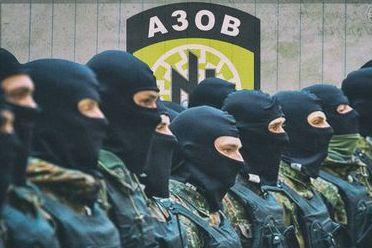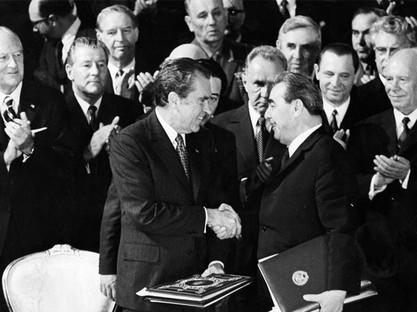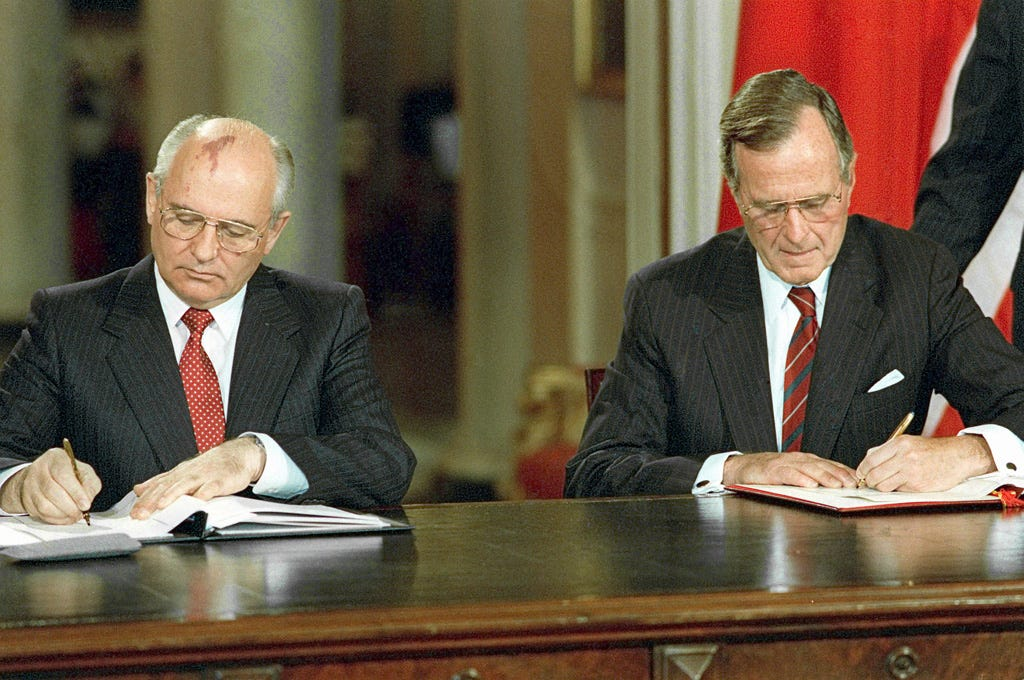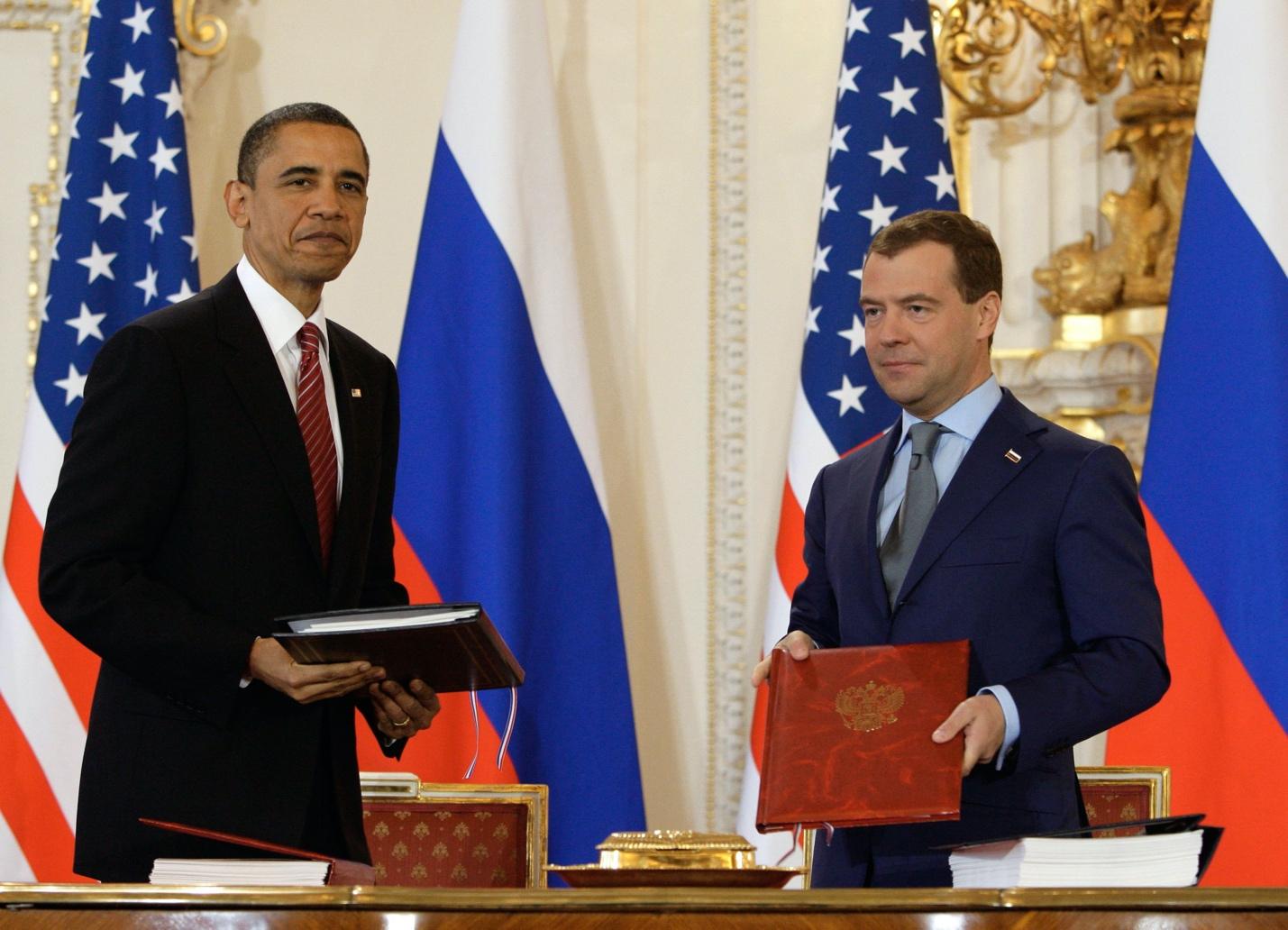
In February 2023, United States Secretary of State Antony Blinken briefly met Russian Foreign Minister Sergey Lavrov and proceeded to give him a “moral” lecture on Russia’s decision to suspend its role in a nuclear arms treaty, and on Russia’s invasion of Ukraine. They were in India for the Group of 20 summit.
USA Today quoted Blinken, who spoke at a news conference during the summit: “I told the foreign minister, ‘End this war of aggression. Engage in meaningful diplomacy that can produce a just and durable peace.’” This kind of naked hypocrisy can tend to baffle the mind. The U.S. was conducting an act of aggression in 2003 when the Bush Jr. regime lied its way into starting a war with Iraq. And it has engaged in many acts of aggression since—in Libya, Syria, Somalia, Ukraine and the South China Seas, among other places. Blinken’s lecturing Lavrov about diplomacy was a hollow gesture. The U.S./NATO alliance has subverted the efforts at diplomacy between Russia and Ukraine.

The U.S./NATO alliance’s ulterior motives have been evident, for those who care to directly look at the situation and to directly understand it. It lied to Mikhail Gorbachev when it promised not to move one inch into Eastern Europe and the former Soviet Republics after the dissolution of the Soviet Union. In 2014, it supported a coup against the elected president of Ukraine, a coup led by Ukrainian right-wing fanatics which included avowed Nazis and fascists. Contrary to the pronouncements by the U.S./NATO alliance about exporting democracy, the actual motive is to make Ukraine another market satellite, where the interests of Western corporations and local elites are realized in the form of private monopolies.
USA Today also said that Blinken assured Lavrov that, whatever the circumstances are, the U.S. would always be willing to discuss arms control. Then why is that not happening now? It appears that the U.S. is prioritizing the fueling of the Russia-Ukraine conflict by sending more weapons to Ukraine, rather than allowing both nations to prioritize negotiations to end the conflict. Contrary to the propaganda, Russia and Ukraine were in the process of negotiating an agreement through the Minsk I and Minsk II discussions.
What happened? The U.S. military-industrial complex, especially the arms industry, is not interested in prioritizing peace. Profits resulting from the conflict are a priority.
In an NPR piece, Blinken was quoted as saying that Russia was irresponsible for backing out of the New Start Treaty (Strategic Arms Reduction Treaty). This may be so, but what provoked Russia into backing out of the treaty? Since the dissolution of the Soviet Union, the international situation has changed.
Operators of the U.S. military-industrial complex have seen this as an opportunity to continue further to dominate the world through the rule of capital (and usually at the expense of labor). With Russia, the U.S./NATO alliance has attempted to encircle it with weaponry in the former socialist countries of Eastern Europe and the former Soviet Republics. It is obvious that this is an aggressive and hostile act.
While Russia is not innocent, it was nevertheless provoked into invading Ukraine, particularly in the Donbas region where there is a population composed mainly of ethnic Russians. The latter voted for independence from Ukraine after the 2014 right-wing coup. Since then, Ukrainian military battalions like the Nazi Azov Battalion have attacked the Donbas. Russia, rather than not doing anything, intervened. (This does not excuse any imperial ambitions Russia may have.)

U.S. officials lecture Russia about it backing out of New START. So, let’s talk about treaties, especially where the U.S. empire is concerned. The United States and the Soviet Union were making efforts to discuss the goal of limiting the arsenals of each country starting in 1969 and continuing into the 1970s. In a fact sheet published by the Arms Control Association, The Strategic Arms Limitation Talks (SALT) were established in May 1972, producing two agreements: the Anti-Ballistic Missile Treaty (ABM) and the Interim Agreement.

In June 2002, the United States backed out of the ABM Treaty, because it said it needed its weaponry to fight terrorists and “rogue Nations.” But this is a weak excuse since the U.S. has built up its military over the years, culminating in a bloated military budget that goes far beyond self-defense.
In June 1979, the United States and Soviet Union signed the SALT II agreement. But U.S. President Jimmy Carter discouraged its continuation when the Soviet Union invaded Afghanistan (which was a whole other story) in December 1979. The treaty was never put into force again.

In May 1986, U.S. President Ronald Reagan ignored the treaty because it was “flawed.” The real reason? Reagan was taking an adversarial position toward the USSR, declaring it an “evil empire.” But Reagan did continue to negotiate with Soviet Leader Mikhail Gorbachev, resulting in the signing of the Strategic Arms Reduction Talks (START I) in July 1991 by George H.W. Bush. The agreements under START I were implemented, and the treaty expired in June 2009.

Going beyond the U.S.-USSR/Russia conflict, the United States, as an empire, has broken many treaties that have been established worldwide.
Journalist and political analyst K.J. Noh wrote a piece published in Toward Freedom, which asserted that the U.S. has made a mockery of treaties and international law. Noh also wrote how the term “international outlaw” characterized the U.S.: “…the United States refuses to sign or ratify foundational international laws and treaties that the vast majority of countries have signed.”
Noh gave examples such as the Rome Statute of the International Criminal Court (ICC), CEDAW (the Convention on the Elimination of All Forms of Discrimination Against Women), ICESCR (the International Covenant on Economic, Social, and Cultural Rights), CRC (the Convention on the Rights of the Child), ICRMW (the International Convention on the Protection of the Rights of All Migrant Workers and Their Families), among other international agreements.

There are international treaties the U.S. has signed but has violated repeatedly. “…examples include the Chemical Weapons Convention, the Biological Weapons Convention, UN treaties prohibiting torture, rendition, kidnapping, and of course wars of aggression, considered ‘the supreme international crime’—a crime that the United States engages in routinely at least once a decade, not to mention routine drone attacks, which are in violation of international law.”
Noh also provided the following example: the AUKUS agreement, the U.S. and Australia being signatories, which violates the Nuclear Non-Proliferation Treaty (NPT). Examples of treaties that the U.S. signed but withdrew from are the Joint Comprehensive Plan of Action (JCPOA) in dealing with Iran, the Agreed Framework and the Six-Party Talks with North Korea (DPRK), the Geneva Conventions, and the Intermediate-Range Nuclear Forces Treaty (INF), among others.
There are also the 368 treaties signed by the United States and Indigenous nations, most of which the U.S. violated.

Writing for The Intercept, Alleen Brown provided information on the opinion of Justice Neil Gorsuch, a Trump-appointed judge on the U.S. Supreme Court. (One may say this is a surprising opinion, given Gorsuch’s political affiliation with the right wing.)
Brown wrote: “Gorsuch lays out the sordid history of the United States’s repeated violations of its treaties with the Muscogee people, dubbed the Creek by settlers. The U.S. government typically obtained treaties coercively, through threatening violence or starvation. In the 1830s, the Muscogee, Cherokee, Seminole, Chickasaw and Choctaw people were forcibly removed from their homelands in the Southeast to what is now eastern Oklahoma. Among the Muscogee (Creek) alone, an estimated 3,500 to 15,000 people died en route to their new territory, a journey known as the Trail of Tears.”

Gorsuch, quoted by Brown, said, “On the far end of the Trail of Tears was a promise. Forced to leave their ancestral lands in Georgia and Alabama, the Creek Nation received assurances that their new lands in the West would be secure forever.” Gorsuch, however, may have sounded too good to be true. He added that treaties can be legally broken since it is the U.S. Congress that decides this. Meanwhile, Indigenous peoples apparently have no real say in this decision.
Other examples of international treaties the United States either refused to sign or did not ratify show how “the Land of the Free and the Home of the Brave” has had a superiority complex.
After the signing of the Treaty of Versailles in 1919 ending World War I, involving the Allied Powers and Germany, U.S. President Woodrow Wilson praised the U.S. role with ultra-nationalist fervor, saying “At last the world knows America as the savior of the world!”
In 1949, the International Labor Convention was established with 154 nations, including the U.S., being signatories. However, the U.S. did not ratify it.
The Geneva Agreement was established in 1954, with Vietnam, France, China, the USSR and Britain as signatories. The U.S. participated in but did not sign the agreement. But it complied with the cease-fire between the two Koreas (ROK and DPRK).
In 1982, the Law of the Sea Convention was established and signed. It detailed how nations would behave in international waters. The U.S. was one of the signers but did not ratify it.
The Mine Ban Treaty was established in 1997, having the goal of prohibiting the production and use of anti-personnel mines. Thirty-three nations signed but did not ratify the treaty. Those nations included the United States, Russia, India and China.

Then there is the New START Treaty, with which Russia suspended its participation. But given past treaty violations, not signing treaties and not ratifying treaties, can the United States be trusted? All nations have committed violations at one time or another. But the United States has been somewhat consistent in that category.
Another problem is that New START is inadequate. Linda Pentz Gunter, writing in CounterPunch, quoted Dr. Ira Helfand, a member of the International Physicians for the Prevention of Nuclear War, who said that “The New START Treaty, while somewhat useful, is a very limited document and a very inadequate treaty. It still allows the United States and Russia to maintain—and they do—3,100 strategic nuclear weapons, ranging in size from 100 kilotons to 800 kilotons. That is six to 50 times more powerful than the bomb which destroyed Hiroshima. Additionally, the treaty “allows both the United States and Russia to maintain arsenals which are capable of destroying modern civilization six times over.”

Gunter asked whether there is any point to START, “‘New’ or otherwise.” She pointed out that the “manufacture, possession, and siting (including in other peoples’ countries)” of nuclear weapons can only be effectively stopped by the Treaty on the Prohibition of Nuclear Weapons. It is encouraged by the United Nations Office for Disarmament Affairs.
Getting back to the Russia-Ukraine conflict, the U.S./NATO alliance is trying to determine Ukraine’s fate, although this should be considered a violation of Ukraine’s sovereignty. But this is a characteristic of the U.S.’s imperial foreign policy.
Ukraine’s President Volodymyr Zelensky does not seem to have an answer for Ukrainians, when one gets down to what he represents and his obedience to Western interests. However, Zelensky may be caught between a rock and a hard place. No doubt he has been threatened by Ukrainian Nazis, even to the point of receiving death threats. He is Jewish and, of course, Nazis are not exactly fond of Jews. Then there is the Russian invasion, which can be called a violation of Ukraine’s sovereignty.
But the situation isn’t so black and white. Russia was provoked, its own sovereignty being potentially threatened by the U.S./NATO alliance, with U.S. weaponry placed in Eastern Europe and the former Soviet Republics, thus attempting to encircle Russia. What was not mentioned by Blinken in his lecture to Sergey Lavrov was this exact situation.
In the aftermath of the meeting, both diplomats criticized each other’s countries. Blinken continued his “moral” lecture about Russia at the Raisina Dialogue’s strategic affairs forum, a security meeting which both the United States and Russia attended.
Quoting from Reuters: “If we allow with impunity Russia to do what it’s doing in Ukraine, then that’s a message to would-be aggressors everywhere that they may be able to get away with it too.” Lavrov recognized Blinken’s hypocrisy and responded, saying that Blinken and the U.S. were practicing “double standards.” Adding to that, Lavrov said that the U.S. has invaded other countries (using the more polite term, “military intervention”) because of “threats to its national interest.”

The U.S. has used the excuse of protecting its national interest, as well as using and abusing the words “freedom” and “democracy” and as a result invaded, occupied and bombed other nations worldwide. Lavrov cited the examples of the Iraq War, air strikes on Libya, and the bombing of Yugoslavia during its civil war in 1999, with NATO contributing to these conflicts.
Lavrov also called out the West as well: “Everybody is asking when Russia is going to negotiate…the West is continuously saying that it is not the time to negotiate yet because Ukraine must win on the battlefield before any negotiations.” In other words, the West will continue to fuel the conflict in the hopes of an unlikely victory by Ukraine. Meanwhile, ordinary Ukrainians pay the price.
Antony Blinken’s “moral” posture toward Sergey Lavrov does not help matters. It is another example of the exceptionalist position the U.S. establishment has clung to for decades. Rather than lecture the world, the United States should contribute to prioritizing equal relationships among nations. Cooperation is better than fear and hysteria against so-called enemies.

CovertAction Magazine is made possible by subscriptions, orders and donations from readers like you.
Blow the Whistle on U.S. Imperialism
Click the whistle and donate
When you donate to CovertAction Magazine, you are supporting investigative journalism. Your contributions go directly to supporting the development, production, editing, and dissemination of the Magazine.
CovertAction Magazine does not receive corporate or government sponsorship. Yet, we hold a steadfast commitment to providing compensation for writers, editorial and technical support. Your support helps facilitate this compensation as well as increase the caliber of this work.
Please make a donation by clicking on the donate logo above and enter the amount and your credit or debit card information.
CovertAction Institute, Inc. (CAI) is a 501(c)(3) non-profit organization and your gift is tax-deductible for federal income purposes. CAI’s tax-exempt ID number is 87-2461683.
We sincerely thank you for your support.
Disclaimer: The contents of this article are the sole responsibility of the author(s). CovertAction Institute, Inc. (CAI), including its Board of Directors (BD), Editorial Board (EB), Advisory Board (AB), staff, volunteers and its projects (including CovertAction Magazine) are not responsible for any inaccurate or incorrect statement in this article. This article also does not necessarily represent the views the BD, the EB, the AB, staff, volunteers, or any members of its projects.
Differing viewpoints: CAM publishes articles with differing viewpoints in an effort to nurture vibrant debate and thoughtful critical analysis. Feel free to comment on the articles in the comment section and/or send your letters to the Editors, which we will publish in the Letters column.
Copyrighted Material: This web site may contain copyrighted material the use of which has not always been specifically authorized by the copyright owner. As a not-for-profit charitable organization incorporated in the State of New York, we are making such material available in an effort to advance the understanding of humanity’s problems and hopefully to help find solutions for those problems. We believe this constitutes a ‘fair use’ of any such copyrighted material as provided for in section 107 of the US Copyright Law. You can read more about ‘fair use’ and US Copyright Law at the Legal Information Institute of Cornell Law School.
Republishing: CovertAction Magazine (CAM) grants permission to cross-post CAM articles on not-for-profit community internet sites as long as the source is acknowledged together with a hyperlink to the original CovertAction Magazine article. Also, kindly let us know at info@CovertActionMagazine.com. For publication of CAM articles in print or other forms including commercial internet sites, contact: info@CovertActionMagazine.com.
By using this site, you agree to these terms above.
About the Author

David Starr acknowledged his interest in politics in 1986 when he lived in Hawai’i.
From there, he became active, joining such groups as the Latin American and Caribbean Solidarity Association (LACASA), the Hawai’i Union of Socialists (HUS) and Ka Lehui Hawai’i (The Hawaiian Nation).
Starr also created a publication entitled Voices of Change, and had articles published in the Honolulu Weekly and Toward Freedom during the 1990s.
Now Connecticut-based, Starr has published many pieces in Reader Supported News, the Daily Kos, and has been published in the LA Progressive.
David can be reached at dl_starr@hotmail.com.


“whatever imperial ambitions Russia may have . . ?”
Better go back and spend a lot more time studying.
Could you elaborate? As far as I know, Russia is mainly in the Donbas region because of requests by the people there. There have been attacks against them by the likes of the Azov Battalion, you know, a Ukrainian, Neo-Nazi entity. I’m not saying the Russian invasion was legal, but there have been provocations against Russia by the U.S./NATO alliance, resulting in a military encirclement. Ideally, sovereignty should be respected, both Ukraine’s and Russia’s.